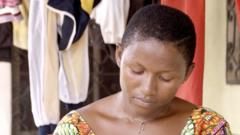Ngabi Dora Tue stands in despair as she remembers her husband, Johnson Mabia, whose life was abruptly taken four years ago by separatists fighting for independence in Cameroon’s anglophone regions. The conflict has deep historical roots, igniting in 2016 with protests against perceived government infringements on rights, quickly devolving into a violent fight for self-determination. Johnson was kidnapped during a work trip, and after his family paid a ransom, he was brutally murdered, leaving Dora and her children to grapple with their future.
The plight of the anglophone population, who have felt marginalized since Cameroon’s unification in 1961, deepened as violent clashes erupted between separatist groups and government forces. With the conflict killing at least 6,000 people and displacing countless others, many, like journalist Blaise Eyong, who fled his hometown, describe gruesome scenes of daily violence, including bodies in the streets and houses set ablaze.
Efforts at national dialogue have failed to resolve the crisis meaningfully, leaving civilians trapped between extreme violence and oppressive government responses. Human rights organizations have documented abuses on both sides; civilians often become victims of government attacks as well. John, a torture survivor, vividly recalls his ordeal at the hands of military forces who sought confessions through brutality.
The education system in the region has also suffered, with many schools shut down by the conflict, leaving children without access to education. The violence continues to escalate as multiple groups fight for power and control, complicating the situation further. Joe, another victim of abduction, reflects on the terror of watching fellow captives executed before his own escape, a stark reminder of the constant fear residents face.
As the conflict rages on, families like that of Ngabi Dora Tue are left to confront their heartbreak and uncertainty, struggling with debts and the enormity of their loss. The separatist forces, while seeking independence, have also seen a rise in internal conflict among various militant groups, further complicating the landscape. Despite claims of a commitment to international law, atrocities continue to plague the beleaguered regions.
With peace seemingly distant, the anguish felt by those caught in this struggle remains palpable, as families mourn their loved ones while grappling with an uncertain future amidst persistent fears of violence.





















